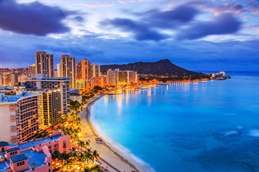
Is a piece of legislation that its critics view as a costly and irksome impediment headed for its demise after a century? The Jones Act, which limits waterborne cargo moves between two US points to US-built, crewed and owned vessels, is under attack.
The law, which was introduced in 1920 under the Merchant Marine Act for the purpose of stimulating US shipbuilding, mandates that service between two US points must be the domain of US-built vessels that are 75% owned and 75% crewed by Americans.
In December, Rep. Ed Case, a Republican representing Hawaii’s first congressional district, which includes Honolulu, introduced three bills aimed at the legislation, arguing that it contributes to the high cost of living in Hawaii.
The first of these would exempt all non-contiguous US locations – Alaska, Hawaii, Puerto Rico and Guam – from the act, while the second would put a cap on shipping rates to these territories to a maximum of 10% above international rates for comparable routes. The third bill is seeking exemptions to any non-contiguous state or territory not served by at least three Jones Act carriers, where each has a market share of at least 20%.
Essentially this would exempt the lot, as most of these are served by just two carriers.
The US Virgin Islands, American Samoa and the Northern Mariana Islands are exempt from the Jones Act, and foreign-flag ships can transport cargo between these islands and other US points.
The ramifications for shipping costs would be massive. According to one estimate, the elimination of the Jones Act could lower shipping costs by as much as 50%. A study published by the Organization for Economic Cooperation and Development concluded that the legislation creates large cost inefficiencies, benefiting the US shipbuilding industry to the detriment of other sectors of the economy.
The cost of the vessels is a huge factor. Opponents of the Jones Act have argued that comparable ships built in non-US shipyards cost about one-quarter to one-fifth of the price tag of US-built vessels.
In some cases, the law has repercussions that go well beyond the cost of shipping. Puerto Rico has imported natural gas from Russia, arguing that it could not do so from US locations as there are no LNG tankers that meet Jones Act rules.
Supporters of the Jones Act are also worried about a recent proposal from the US Customs & Border Protection agency (CBP) to change the interpretation of some elements of the law. These letter rulings, which the agency has established over decades – often amid heated controversy – cover the deployment of foreign flag ships in offshore applications.
Specifically, the CBP is adopting a broader definition of the term “vessel equipment” versus “cargo,” reasoning that anything that remains on board when the ship leaves the offshore site should be classified as equipment. This would include vessels equipped with cranes serving offshore installations like oil rigs or wind farms.
The move sparked furious opposition from supporters of the Jones Act. A bipartisan group of congressmen sent a letter to the Homeland Security Agency and to the White House arguing that these changes undermine the intent of Congress to protect the legislation.
Aaron Smith, president and CEO of the New Orleans-based Offshore Marine Services Association (OMSA), expressed his organization’s disappointment that CBP wants to “put America second by creating potential loopholes for foreign vessels and crews to unlawfully operate in American waters and take the jobs of American vessels and workers.”
OMSA and the American Waterways Operators complained that the latest CBP move marks the fourth attempt to undermine the Jones Act since the current administration took office in 2017.
A proposed waiver of the law to allow foreign-built LNG tankers to supply Puerto Rico and the Pacific Northwest was rebuffed by the president in 2017. The Department of Homeland Security temporarily waived the Jones Act requirement on a couple of occasions. It allowed the use of foreign flagged ships to take fuel to Puerto Rico during Hurricane Irma and issued a waiver to non-US vessels to carry emergency supplies to the territory in the wake of Hurricane Maria.
For his part, Rep. Case is on a second charge against the legislation. He first tabled bills seeking to reform it in 2003.
Critics of the law hope that this time the momentum will continue to build. One catalyst could be the rise of offshore wind generation, which is expected to undergo a prodigious growth spurt in the coming years, with several US East Coast states poised to set up offshore wind farms. Some projections envisage this to grow to a US$70 billion business by 2030.
“The Jones Act will play a very important role in deliveries to offshore wind locations,” says Colin D’Abreo, president of Rhenus Project Logistics.
He thinks that change of the law and its application will come slowly, beginning with waivers granted on a case-by-case basis, mostly in disaster situations. Long term, he hopes there will be bolder change to facilitate new opportunities like the establishment and supply of offshore wind farms.
By Ian Putzger
Correspondent | Toronto




